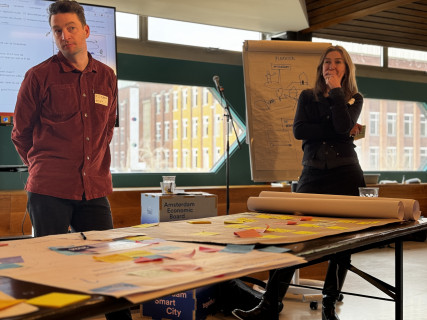In the past decade, we have witnessed a surge of cooperatives across society. From community-led energy projects to endeavours in collective mobility and housing, citizens and companies are increasingly organizing themselves to shape their surroundings, often driven by sustainability and social goals and most of them do this in a not for profit way. Despite this rich history and the ongoing proliferation of initiatives, cooperative efforts and their benefits often remain small-scale and localized and, in most cases, accessible only to specific and select demographics.
This challenge aims to help civil society organizations in the energy domain, such as energy cooperatives, to become more mainstream. We aim to create recognition, to create an understanding of mutual interests with the key stakeholders they have to work with, and to exchange knowledge for these organizations to grow faster or repeat.
Project phase
What is the goal of the project?
This challenge aims to understand how to mainstream civil societal initiatives in the energy domain, such as energy cooperatives. We aim to create recognition, to create an understanding of mutual interests with the key stakeholders they have to work with, and to exchange knowledge for these organizations to grow faster or repeat.
Our inspiration stems from the ambitious "moonshot" from the Waag and the Amsterdam Economic Board, which aims to inspire and build broad support to achieve 50% of energy generation from societal initiatives in the Netherlands by 2050.
What is the result of the project?
By making societal initiatives more mainstream, we hope to accelerate access to renewable energy for citizens and corporations which in turn will accelerate the energy transition, and will give citizen access to affordable energy.
Who initiated the project and which organizations are involved?
The Amsterdam Economic Board initiated this together with the Waag. DRIFT, Hieroo, the HvA, the municipality of Haarlemmermeer, and SPIE have expressed an interest in continuing to work on this challenge.
What is the next step?
Since the start of this project we have done a deepdive session together with societal organizations such as EnergieSamen, 02025, Zuiderlicht, Waag, and other relevant parties for this topic, such as banks, governmental organizations and knowledge institutions. In this session we have:
• Formulated a value map of all the parties.
• Defined a shared language between the parties.
• Created an overview of all the different interests.
• Shared our hopes and fears on this topic.
The Waag has also done multiple 1-on-1 interviews with societal organizations, to further investigate what the hurdles are for energy cooperatives.
The results of this research were presented on the 16th of September at the second edition of the Netcongestion Learn & Share event organized by the Amsterdam Economic Board (https://amsterdameconomicboard.com/en/news/energy-communities-the-solution-for-congestion/).
Would you like to learn more about this challenge? Please reach out to noor@amsterdamsmartcity.com.
What can other cities learn from your project?
Public-private collaboration have by now become familiar territory, but civil-public and civil-private are often still complicated. These collaborations require a common infrastructure, and a foundation of shared values. This takes time, and is complex, but provides the necessary long-term solutions. Energy communities can contribute to sustainability, social value creation, innovation for decentralised energy systems, strategic autonomy and resilience.





